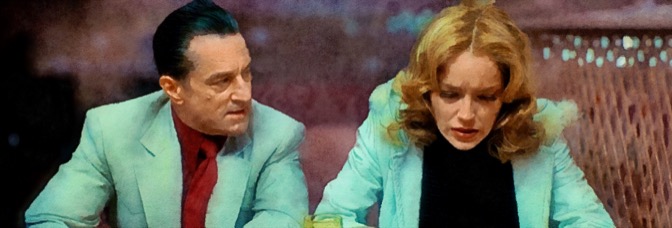The best part of Casino isn’t my favorite part of Casino because the best part is James Woods bickering with Erika von Tagen. It’s mainly in the background, and it’s the only time anywhere in the film anyone shows any personality not expressly required for their scenes. Director (and co-screenwriter) Scorsese doesn’t believe in background action; if it’s not foreground, it doesn’t matter. The problem is von Tagen is a kid, and Sharon Stone’s her mom, and Woods is the pimp who groomed Stone from age fourteen. The movie doesn’t even seem to see its problem, which isn’t a surprise because Casino is holy shit levels of misogynist.
My favorite part of Casino is a scene where Robert De Niro bitches about Stone being all about money and fame when he’s walking through the dressing room for the showgirls who dance on his big-budget local talk show. He needs the talk show so he can bitch about how the state government is targeting him even though he’s just a successful businessman who happens to be helping the mob steal from their own casino. During that sequence, when Casino is dragging its way through its second act, it’s clear just how little self-awareness has gone into making the film.
It hurts De Niro the most, as he plays a caricature of Robert De Niro in a mob movie. He spends most of his time not being the super-genius bookmaker he’s supposed to be and getting more possessive and controlling of Stone, a successful Vegas hustler who De Niro gaslighted into marrying him. The omnipresent narration (by De Niro, Joe Pesci, and occasionally a surprise narrator for effect, but never Stone because women don’t think) sometimes teases a significant plot development involving the mob, the FBI, or the casinos. Still, until the rote mob clean-up sequence at the end, it’s always about De Niro and Stone. Specifically, De Niro being awful to her, Stone reacting poorly, and De Niro being more and more horrific. It’s a strangely crap part for Stone. She’s there to decorate and be decorative, and when she refuses to decorate, well, De Niro’s done with her.
The film runs three hours. The first act takes about an hour, almost all of it in summary, with the first twenty minutes or so jumping ahead, jumping back, filling in the details from different perspectives (well, De Niro’s and Pesci’s), and dumping a bunch of great exposition about how the mob ran Vegas. The second hour and a half is about Stone’s failings as a weak woman bringing down De Niro, which will eventually affect Pesci, then the casino, then the mob, then Vegas itself. Also, we’re not sure who’s narrating from Norma Desmond’s swimming pool because the movie opens with De Niro getting blown up in a car bomb. Once you’re narrating from beyond the grave, anything’s possible.
Though not De Niro’s character listening to The Rolling Stones all the time, and they’re practically every other song. Casino’s got a great soundtrack. Clearly, a lot of work went into it. Shame more didn’t go into the writing.
Given the speedy first hour and the absolutely fantastic procedural set-up, it seems like Thelma Schoonmaker’s cuts alone make the picture coherent. It looks excellent–Scorsese and cinematographer Robert Richardson do a remarkable halo effect with the lighting, then some cool spotlighting later—but the “scenes” are so short, it’s hard for anyone to work up any acting momentum.
Except Pesci and Stone, who both do well until they just can’t beat the film working against them. De Niro’s never particularly good, always just fine. Not exactly miscast, but the part’s so thin it gets blown around the frame. If it weren’t for his spectacular wardrobe (having De Niro look glamorous in his silly clothes really works against the film) and Richardson’s lighting, you could forget De Niro’s even there.
The supporting cast has some good acting, but no one’s in it long enough to give full performances. Woods is excellent; Don Rickles and Alan King are perfect, but scenery. Rickles is in an extended cameo; King is just a cameo. The most significant supporting part is Frank Vincent as Pesci’s chief goon. He’s fine, but the narration explaining his behavior does a lot more than anything Vincent can do onscreen.
It’s clear from the start Casino’s got a low ceiling and will probably just be a masterfully directed mess, but it ends not even being energetic enough to be considered a mess. I suppose it’s vaguely interesting to see how the film presents De Niro as a hero, but even then, not really. The writing is too tepid, and there’s nothing to his performance past the pomp. It’s most disappointing for Stone and Pesci. Scorsese and Casino fail them. Besides them (and De Niro), everyone else in Casino gets to ride the prestige wave while it lasts.
Shame it’s in such a shallow pool.

Leave a Reply